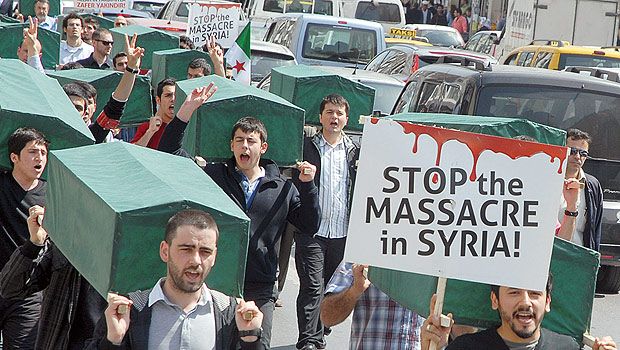
Beirut, April 8: Syrian troops pounded opposition areas, activists said, killing 74 civilians in an offensive that has sent thousands of refugees surging into Turkey before next week’s UN-backed cease-fire aimed at staunching a year of bloodshed.
At least 15 rebels and 17 security force members were also killed, raising the death toll in violence to over 100. Each side has accused the other of intensifying assaults in the run-up to the truce due to take effect early Thursday if government forces begin pulling back from towns 48 hours earlier in line with UN-Arab League envoy Kofi Annan’s peace plan.
The military shelled Deir Baalba district in the restive city of Homs, killing four people, the grassroots Local Coordination Committees opposition group said. Thirteen men were also found killed in cold blood in the same area, it said.
Amateur activist video showed scenes of carnage said to be the aftermath of the shelling. Mangled limbs and body parts in blankets were being loaded on a pick-up truck. A second video showed 13 men who appeared to have been tied up and executed.
The Syrian Observatory for Human Rights said at least 53 people had been killed, including 40 in an army attack on Al-Latmana, in Hama province, that began on Friday. In an activist video from the town, mourners held aloft the limp corpse of a child. Bodies were laid out in a row on the ground.
A rocket hit a bus traveling from Lebanon to Syria at Jousa just inside Syria, a Lebanese security source said. Witnesses said six Syrians were killed. Lebanese medics confirmed two dead and nine wounded. It was not clear who had fired the rocket.
Rebels trying to oust President Bashar Assad attacked army posts north of Aleppo before dawn, killing an officer and two men, and assaulted a helicopter base, activists said. Syrian commandos shot dead three rebels in an overnight raid on a “terrorist den,” Syria’s state news SANA agency reported. Country towns north of Aleppo have endured days of clashes and bombardment, prompting 3,000 civilians to flee over the Turkish border on Friday alone — about 10 times the daily number before Assad accepted Annan’s plan 10 days ago.
The Syrian leader is fighting a popular uprising, which he blames on foreign-backed “terrorists,” that has spawned an armed insurgency in response to violent repression of protests. The bloodletting of the past week or so does not bode well for implementation of Annan’s cease-fire plan. This requires Assad to “begin pullback of military concentrations in and around population centers” by Tuesday.
Rebel Free Syrian Army commander Col. Riad Al-Asaad said his men would cease fire, provided “the regime ... withdraws from the cities and returns to its original barracks.”
Syria has said the plan does not apply to armed police, who have played a significant role in battling the uprising in which security forces have killed more than 9,000 people, according to UN estimate. Syria says its opponents have killed more than 2,500 troops and police since the unrest began in March 2011.
Annan’s plan does not stipulate a complete army withdrawal to barracks or mention police. Satellite pictures published by US Ambassador Robert Ford showed Syrian artillery and tanks still close to communities.
“This is not the reduction in offensive Syrian government security operations that all agree must be the first step for the Annan initiative to succeed,” Ford said in Washington.
A statement by UN Secretary-General Ban Ki-moon said the April 10 timeline “is not an excuse for continued killing.”
“The Syrian authorities remain fully accountable for grave violations of human rights and international humanitarian law. These must stop at once,” Ban said.





Comments
Add new comment